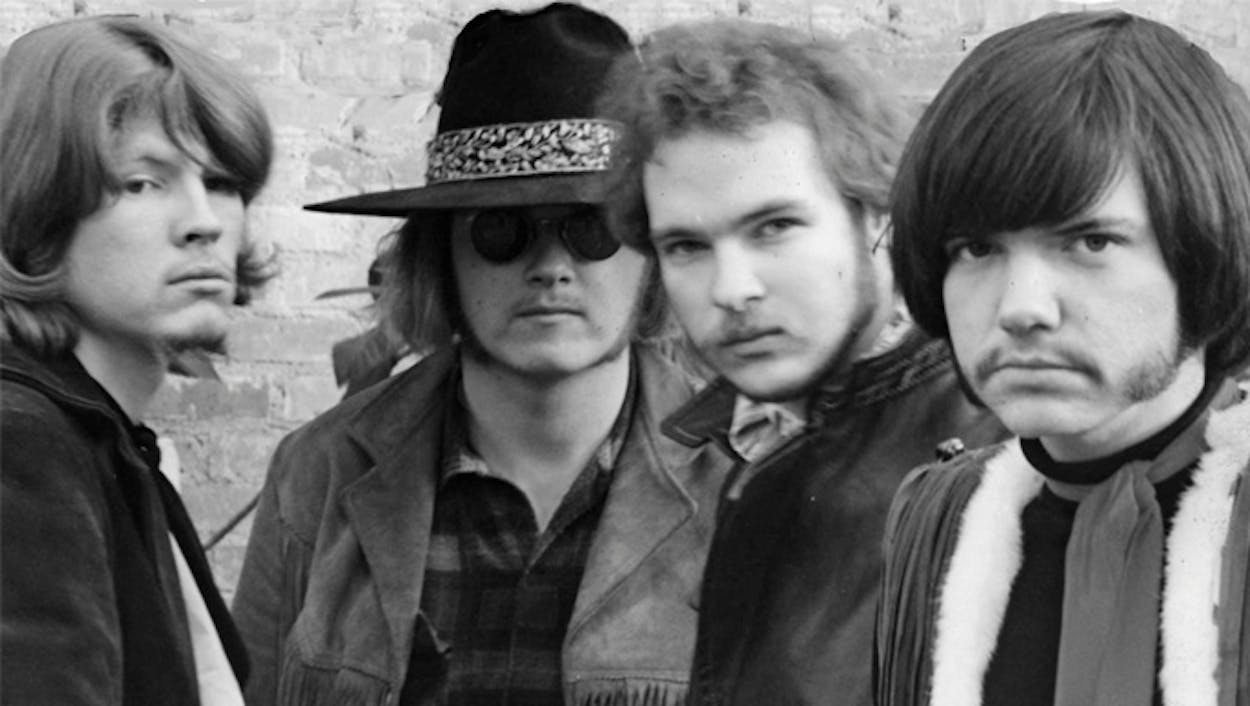Before the beards, cars and fuzzy guitars, Billy Gibbons led the Moving Sidewalks, a loud, bluesy Houston-based quartet that helped draft the blueprint for ZZ Top while building on the late-sixties psychedelic rock movement that was blooming simultaneously in Texas and San Francisco.
The Moving Sidewalks scored a few regional hits, toured with Jimi Hendrix, recorded an album and parted ways in 1969, when the bassist, Don Summers, and the keyboardist, Tom Moore, left for Vietnam. Soon after, Gibbons and the drummer, Dan Mitchell, kick-started an early version of ZZ Top.
A box set released last year by RockBeat Records, Moving Sidewalks—The Complete Collection, was assembled to celebrate the group’s brief run and return its long-out-of-print music to the marketplace. But it also inspired the B.B. King Blues Club & Grill in Manhattan to offer the band a reunion show on March 30.
With a hole in ZZ Top’s touring schedule that allowed for eight weeks of rehearsal, all four original members agreed. The sold-out concert marked their first performance since a 1969 farewell show at a Houston club called the Love Street Light Circus Feel Good Machine. Next Sunday, the Sidewalks will make their reunion official in Texas with a headlining slot at the Sixth Annual Austin Psych Fest, a three-day music festival dedicated to “mind-expanding music.”
The morning after the Manhattan show, Gibbons called from the Waldorf-Astoria Hotel to discuss the band’s legacy, reunion and future plans:
The vast majority of the crowd at the New York gig must have known you only as a member of ZZ Top.
From the stage, it felt like most of the room was maybe 20 to 35 years old. These are people not even born when we were making music back in 1969. There were a handful of people waving the Sidewalks’ first album. I saw original American pressings, and I saw the French and Italian bootlegs. But what they experienced at the show was a band applying full-fledged maturity to something we started in 1967.
In some ways, it seems they also got a look at what could have been.
When we walked off that stage, we shook hands and went into the dressing room to wind down. Very quickly, everything got quiet and somebody said, “There were fleeting moments that time-traveled back to ’69, like we never left.” I said, “You got that, too?”
Those fleeting moments—the bridge, the reconnection between the sixties and now—felt weird. But weird was the order of the hour. It’s psychedelic rock. We were supposed to be weird. It was weird back then; why not now?
The set list featured the Jimi Hendrix songs “Foxy Lady” and “Red House.” I imagine that’s a nod to the fact that Hendrix championed the Moving Sidewalks in the press, toured with you and invited you to jam.
We’ll always cherish that time. It was like school. We were front and center watching a guy inventing things on a guitar the designers never imagined. And it stayed with me the rest of my life.
Our bassist, Don Summers, turned to me at one point onstage and said, “Man, I didn’t know Hendrix was still inside of you.” He always is. He always is.
When you look back at the 13th Floor Elevators in Austin and the Moving Sidewalks in Houston, does it seem odd that the psychedelic rock movement happened in what was still largely conservative, country-music-loving Texas?
There was no more unlikely spot than Texas for this to happen. The question became, How did all this energy get there? What could have landed over the Lone Star State that ignited this creative outpouring? And we just don’t know.
The Elevators were peers, but also an influence, right?
They were the influence. Hence the name. I wanted to match their name with one that also conveyed an element of consciousness expansion. You get on an elevator, you go up. You get on a sidewalk, you go forward. They were incredible.
Roky Erickson of the Elevators will play Psych Fest the same day you will. But perhaps more important, there are dozens of young bands playing that weekend that are keeping the psychedelic rock torch lit.
It’s great to be part of that history, to watch it come full circle. We’re booked to close the event on Sunday, but I’ll be there from Friday on, running around seeing music. I want to quiz some of these other acts on how deeply they listened to Elevators records. Because that’s what I’m doing — I’m studying those records, too, decades later, trying to penetrate the depth of what is contained in those performances. They’re complex.
After Psych Fest, do you see a future for the Moving Sidewalks?
Absolutely. Right now it’s a curiosity. There’s an elegant box set. And two shows? That’s great and unexpected, but those moments evaporate. So you’re left with 1969.
How do you express it as an extension? You go back in the studio and provide a repeatable event, called an album. I’ve talked it over with the guys. I said, “Let’s legitimize this. Let’s make this credible. Let’s ignite a new reality.” We’re all in.
- More About:
- Music






